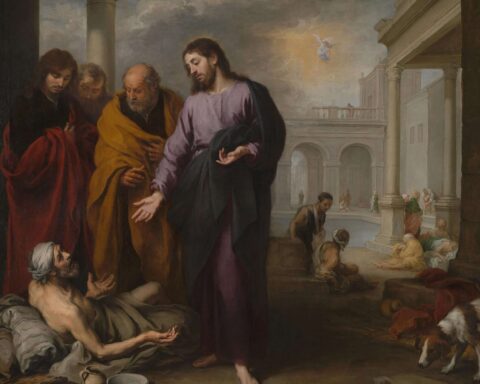It’s easy to say, “It’s about the journey, not the destination,” especially when our plans get thrown off track. This idea truly resonates with the story of Job, whose path was one of intense suffering and questioning, but ultimately led him closer to the heart of God. In this final post of our series on Job, we explore how his journey offers us a lens through which to view our own struggles with faith, suffering, and restoration.
Reformation Sunday: A Journey of Trust and Change
October 27, we celebrated Reformation Sunday. In 1517, Martin Luther nailed his 95 theses to the door of the Wittenberg Church, challenging practices within the Catholic Church, especially the sale of indulgences. This act, born from Luther’s conviction that salvation is by grace through faith, sparked the Protestant Reformation. Luther’s journey wasn’t without difficulty — he faced excommunication, threats, and opposition. Like Job, he wrestled with the idea of God’s justice, coming to a renewed understanding of grace that still shapes faith communities today.
The courage to trust God’s timing in bringing about reform reflects the same trust Job learned to have. While Luther’s journey led to a visible transformation in church history, Job’s was one of personal transformation, marked by a growing trust in God amid suffering. Both men, despite different paths, discovered a profound truth: God’s ways are beyond our control, and in that mystery, we find grace.
Job’s Story: From Questioning to Trust
Job’s journey was an emotional rollercoaster. He lost his family, his health and his wealth, and his friends insisted he must have done something to deserve it. Overcome with sorrow, Job challenges God, asking why this suffering has befallen him. In Job 13:3, he boldly says, “I desire to speak to the Almighty and to argue my case with God.” Like so many of us, Job seeks answers and a sense of control.
God finally answers Job — not with a list of reasons but by revealing the grandeur of creation and the limits of human understanding. It’s in this moment that Job realizes he has been viewing his situation through a narrow lens, missing the bigger picture. His response is humble repentance:
“My ears had heard of you but now my eyes have seen you. Therefore I despise myself and repent in dust and ashes” (Job 42:5-6).
Job’s repentance isn’t about sin, but rather a recognition of his human limitations and a submission to God’s wisdom. How often do we demand answers in our own pain, thinking we’d understand if God just explained himself? Job’s journey reminds us that sometimes it’s not about the answers but about recognizing God’s presence and greatness.
Restoration Through Faith and Forgiveness
Job’s journey of restoration begins in a surprising way. God asks him to pray for his friends, the very ones who accused him. This act of intercession, praying for those who hurt him, is both humbling and healing. And after this act of prayer, Job’s fortunes are restored — he’s given twice what he had before, and his family is rebuilt.
Notably, Job’s daughters receive an inheritance along with his sons, breaking with cultural norms and showing a new openness in Job’s character. Perhaps through his suffering, Job’s heart opened in ways that brought about greater compassion and justice for those around him.
Learning to See God’s Goodness
When Job finally moves from hearing about God to “seeing” God, he enters into a more profound relationship, one where he doesn’t need all the answers to trust. This transformation calls us to ask ourselves, “Am I only hearing about God, or am I truly seeing him at work in my life?”
For many of us, this moment comes after pain and healing. In my own life, there have been seasons of loss and confusion, where I clung to verses like Jeremiah 29:11: “For I know the plans I have for you…plans to give you hope and a future.” I, too, needed to shift from hearing about God’s goodness to seeing it — feeling his peace even before knowing the outcome.
Faith in Unseen Restoration
This week’s New Testament reading, Mark 10:46-52, tells the story of Bartimaeus, a blind man who calls out to Jesus despite others telling him to be quiet. Bartimaeus’ faith leads to instant healing, whereas Job’s restoration unfolds slowly. Yet both stories point to the same truth: God is a God of restoration, whether it’s immediate or gradual.
Job and Bartimaeus both faced doubters — friends who judged Job’s suffering and crowds who rebuked Bartimaeus. Yet their faith and persistence led them to a deeper encounter with God. It reminds us that whether we’re facing a dark night of the soul or a time of immediate healing, trusting God is the way forward.
A Final Encouragement
Reflecting on Job’s journey, we’re reminded that God often answers our deepest questions with an invitation to trust rather than a detailed explanation. As the Asbury Bible Commentary puts it, the wisest response to life’s hardest questions is often simply, “I don’t know.” But in that mystery, we find an opportunity to draw near to God, who knows our coming and going.
So today, if you’re seeking answers, take a step back and ask to see God’s goodness. Let that be your prayer: not necessarily for an outcome, but for an awareness of his power, love and grace surrounding you now. As Psalm 121:8 reminds us, “The LORD will watch over your coming and going both now and forevermore.” Trust that he is with you, along every step of your journey.









